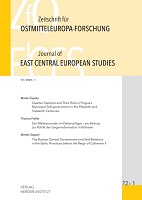The Russian Central Government and Serf Relations in the Baltic Provinces before the Reign of Catherine II
The Russian Central Government and Serf Relations in the Baltic Provinces before the Reign of Catherine II
Author(s): Marten SeppelSubject(s): Political history, Government/Political systems, 18th Century, Roman law
Published by: Verlag Herder-Institut
Keywords: Baltic provinces; Russian Empire; serfdom; Rosen Declaration; Baltic historiography; the reception of Roman law;
Summary/Abstract: Early Baltic historiography was rather emotional in its presentation of manor-peasant relations in the Baltic provinces during the first decades under Russian rule. No doubt it was influenced by the case of the so-called Rosen Declaration of 1739, an exceptionally wellknown document in which the Livonian nobility justified their harsh and repressive rights over the local peasantry. The article argues that, without a careful contextualization and detailed examination of materials from the archives of central institutions, it is not possible to critically assess or characterize either Livonian serfdom or the Rosen Declaration. The central St Petersburg institution responsible for overseeing the issue of serfdom in the Baltic province was the Justice College for Livland and Estland Affairs. Its archives have survived mainly in Moscow, partly in Tartu and in Helsinki, but have never received the attention they deserve. They show that, up until the reign of Catherine II, the Russian administration showed little interest in serfdom in its provinces of Livland and Estland. During the 1730s and 1740s the rights of the peasants were discussed several times in the Justice College, although only in the context of a concrete complaint or a case. Compared to Otto Fabian Rosen’s statement with other similar explanations sent to the capital, Rosen’s view was considered quite routine in St Petersburg. All such statements regarding serfdom made by the Baltic provinces were taken seriously by the Justice College for Livland and Estland Affairs. However, this does not mean that Rosen’s memorial had any wider legal consequences. The local nobility saw their power over their peasants as something very absolute; but this was not unique to Livonia, being a quite typical attitude for landlords in the East Elbian region.
Journal: Zeitschrift für Ostmitteleuropa-Forschung
- Issue Year: 72/2023
- Issue No: 1
- Page Range: 59-86
- Page Count: 28
- Language: English

